This article previously appeared on Crossfader
Contributors Ian Campbell, Kevin Cookman, and Sam Wall headed to Sundance 2018 , the first time we’re covering it as accredited press! Here’s a roundup of what they’ve caught so far, presented alphabetically.

306 HOLLYWOOD
Directors: Jonathan and Elan Bogarin
Genre: Documentary
The non-fiction film movement always has some kind of presence at Sundance, from last year’s CASTING JONBENET to earlier entries like CAMERAPERSON or KATE PLAYS CHRISTINE, but they never quite reach the acclaim of traditional documentaries that are the festival’s bread and butter. Like many of its predecessors, 306 HOLLYWOOD takes a different tact than the run-of-the-mill doc, attempting to portray the journalistic truth of its story along with the visceral lived experience. The story itself is simple, but executed elegantly. The director’s, Elan and Jonathan Bogarin, focus on the life and death of their grandmother: her early life as a fashion designer through their childhood to her eventual death from pneumonia. Along the way they use miniatures, archaeological techniques, reenactments, and hours of interviews with the woman herself to give layered insight into how they viewed her as children and how she viewed herself.
Beyond the surface-level niceness of a creative exploration of a spunky woman, 306 HOLLYWOOD expresses broader ideas about metaphysics (What makes a person? What is consciousness?) and the burden and gift that is memory. It’s as much a meta-narrative about the power of context as it is magical-realist meditation on people and the spaces they inhabit. If there’s any faults to be found, it’s that these various, increasingly cute methodologies distract from the human at the center of the film. But it’s also these layers of technique and meaning (along with a whole mess of charm) that make 306 HOLLYWOOD an early standout and an excellent, approachable example of non-fiction film. [Ian Campbell]
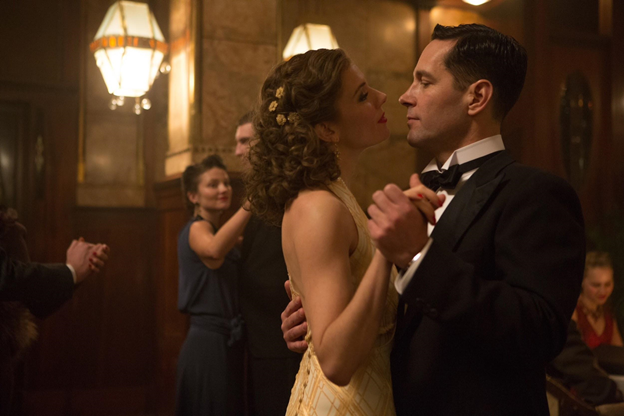
THE CATCHER WAS A SPY
Director: Ben Lewin
Genre: Historical Drama
America’s favorite treasure, Paul Rudd, goes for the triple axel with his dramatic turn in THE CATCHER WAS A SPY and not only flubs the landing, but slices his guts out with the skates on the way down. Joining the ranks of Steve Martin in PENNIES FROM HEAVEN and every other horrible comic actor turned dramatic—Nah, you know, that’s unfair to Steve Martin—joining the ranks of the all-time worst leading man performances in a major Hollywood picture is good ol’ bud Paul Rudd with his turn as Moe Berg, real-life Red Sox catcher turned American spy. Where to start? Playing Berg at the level of “Whispery Noir Guy” of a 12:32 AM SNL-slotted sketch, Rudd is as loyal to a Boston accent as Donald is to Melania. His trench coat, consuming him like a rapidly flourishing mold, moves side to side as he waddles down cobblestone streets doing his best “funny 1930s guy walk.”
Director Ben Lewin is so cruel; he stacks Rudd up against Jeff Daniels, Paul Giamatti, Guy Pearce, Tom Wilkinson, and Mark Strong. It’s a goddamn bloodbath. Every line is delivered with the conviction of a fast food order, every mannerism over-practiced in the mirror. Rudd isn’t completely to blame: Lewin provides no insight of Berg beyond his enigmatic nature. The film doesn’t understand its subject and Rudd has even less of a clue of what the Hell to do. This feels like a made-up movie that Larry David walks onto the set of so he can include a Paul Rudd cameo for the new season of CURB. THE CATCHER WAS A SPY is a movie we would’ve made in 2006, and even then it’d be a flop. Embarrassing. [Kevin Cookman]
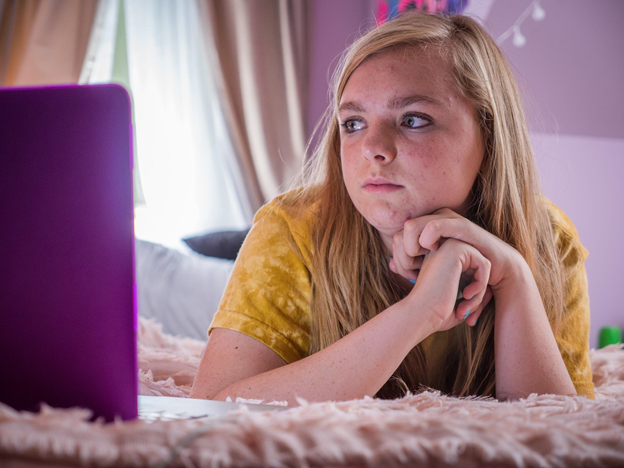
EIGHTH GRADE
Director: Bo Burnham
Genre: Comedy
A crutch for many coming-of-age movies is to revel in the awkwardness for comedic beats—sure, fumbling and bumbling is comedy 101, but there’s often a misguided lack of sensitivity. Such isn’t the case with Bo Burnham and his debut feature EIGHTH GRADE, an acute portrait of a young woman coming of age. Few other films believe in their protagonist through thick and thin as much as this does—EIGHTH GRADE truly uplifts and sees the goodness in Kayla, played expertly by Elsie Fisher, her performance so natural that the experience of watching the film veers into voyeurism. Compared to Bo’s heavily regimented, cue-dependent stand-up sets, this is remarkably off-the-cuff and naturalistic; the flairs of style are few and wonderful, but most times, this has an Andrea Arnold quality to it. Bo’s approach is uncomplicated and its the root of many of the film’s genius decisions, namely the narration stemming from Kayla’s self-help vlogs, filled with confident advice that she can’t find in herself to embrace.
It’s so genuine: kids scream Vine references (“LEBRON JAMES!” is a fantastic, subtle running joke), share relevant memes, listen to the appropriate music, gah, it’s all so textured. This thing gets unexpectedly harrowing and intense, with a game of Truth or Dare being one of the new all-time scariest movie scenes, but Bo sees the truly good in the world while fully recognizing how horrific our social values are, almost always in the same scene. The cherry-on-top is the anti-intellectual, bumbling Joe Schmo version of the climactic CALL ME BY YOUR NAME monologue in the third act, a speech so heartfelt yet so stunted. We’re accelerating into a future where our communication skills are horrendously stilted. We already see the effects; tapping into the power core of even a fellow family member’s feelings is a feat, and we all need to figure out how to connect again. That’s the name of the game here. A movie all about the internet that never gets preachy about it. Both a comedian’s comedian and a favorite among casual comedy fans, Burnham is now a filmmaker’s filmmaker and a pleaser of the people. A Sundance standout: the guy is just way too talented. [Kevin Cookman]
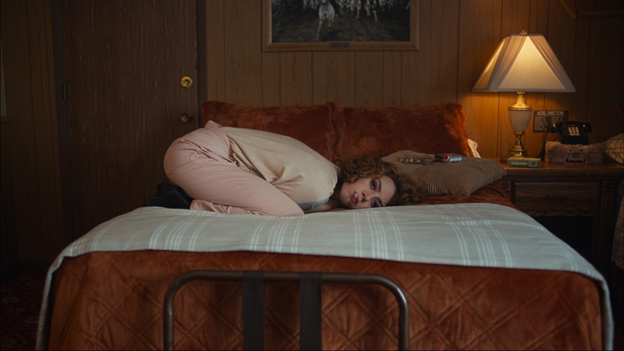
AN EVENING WITH BEVERLY LUFF LINN
Director: Jim Hosking
Genre: Comedy
While Jim Hosking’s THE GREASY STRANGLER remains a divisive film around Crossfader Magazine, I’m proud to tout the movie as an all-time favorite. A transgressive, oddly heartfelt war of the roses, Hosking flaunted an absurdist sense of humor that rang similar to John Waters, Wes Anderson, and vat of toxic waste. I saw the evolution of that film being an increased scope of story, one that existed on a national scale; what I didn’t foresee being the natural next step was to do that type of movie, but with celebrities. Starring Aubrey Plaza, Jemaine Clement, Emile Hirsch, and Craig Robinson, Hosking stacks his latest with incredibly talented folks who struggle to reclaim the same greasy magic. Tim and Eric absurdism works best with unsuspecting amateurs because of the level of earnestness; they don’t really get what’s so funny, but they’ll do it. This star-studded ensemble delivers fine performances, especially a beguiling Plaza, who I’d be interested in seeing more dramatic work from, but at times, they really don’t ~get~ it, and it’s all because they do ~get~ it. Actors purposefully performing off-kilter becomes quite cringe-inducing, and not in the intended sense.
This is a far more grounded film, a treacherously accessible one, detailing an odd romantic noir of sorts, with Plaza being the femme fatale whose intentions are never once clear. It’s the intense bizarreness of THE GREASY STRANGLER, but edited like a Jay Roach movie. That’s a big problem: comparatively, this is a “normal movie” for Hosking, so it opens itself up to being judged on that non-midnight movie level. And gee whiz, the second act is a slog, with no new character or plot development and everyone stuck in this mind-numbing arrested development of no new material for the jokes to bounce off of—there’s a solid stretch of AN EVENING WITH BEVERLY LUFF LINN that simply goes braindead. While the shtick gets old and the jokes aren’t as strong as the previous outing, I still somehow had fun with it, its best gags making me choke laughing. If anything, I cannot wait for the Tumblrs dedicated to the plethora of outstanding outfits the film puts Aubrey Plaza in. [Kevin Cookman]
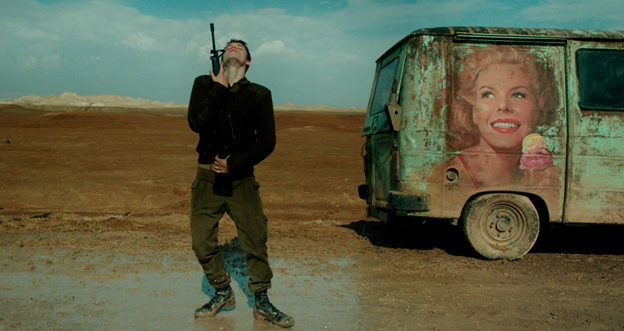
FOXTROT
Director: Samuel Maoz
Genre: Drama
There shouldn’t be much room for fatalism or nihilism these days. Given the growing cultural, racial, and economic divisions at home and abroad, a film that posits “lol, everything is random” shouldn’t be very comforting. And yet, FOXTROT, directed by Israeli filmmaker Samuel Moaz, finds some light in an unfeeling universe. The film is divided into three sections, focused on a Tel Aviv couple learning their son has been killed at war, their son working a military checkpoint, and the aftermath of the two events six months later. FOXTROT applies rigid visuals and form to a narratively messy series of events, mirroring the character’s attempts to bring order to chaos and preempt the unpredictable.
Anchoring the film is Lior Ashkenazi as father Michael Feldmann, an angry, weak, but ultimately compassionate character who in turns lashes out and tries to repair his mistakes as his family entropies around him. Ashkenazi largely communicates this through his physical performance, hiding a boiling sea of rage and sadness behind his emotive face and hunched body. He’s one of many excellent performances in FOXTROT, equally matched by Sarah Adler as Daphna Feldmann and Yonaton Shiray as Jonathan, their son. As these characters are driven apart, realizing their powerlessness and entrapment in a seemingly endless cycle of violence, they also rediscover each other. FOXTROT implies that in a senseless life, the only stability or at least semblance of comfort is derived from our relationships to other people. That provides a strange amount of comfort even if it’s not truly a solution to the “problem” of living. And in war and in life small comforts can be everything. [Ian Campbell]
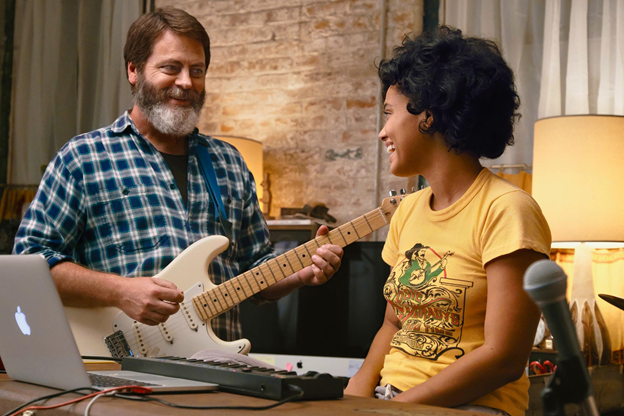
HEARTS BEAT LOUD
Director: Brett Haley
Genre: Dramedy
Ah, the quintessential “Sundance movie”: a twee, all-inclusive, yet still overwhelmingly Caucasian tale of small stories and even smaller stakes. Brett Haley’s HEARTS BEAT LOUD is Sundance’s closing night film, a sort of LADY BIRD + SING STREET hybrid that has the bite and grip of a gumming puppy. Starring a stiff-as-Hell Nick Offerman (there’s a reason we’ve type-casted him as Ron Swanson types) and ever-talented up-and-comer Kiersey Clemmons as a father/daughter duo who stumble into becoming a two-piece band, it’s a story of the struggling middle class made by people who aggressively misunderstand financial distress. Who living in Red Hook would live this irresponsibly?! If your only business is managing a record store, then why would you buy daily specialty coffee and scones?!
It’s one of those films where characters explain themselves constantly, every line meant to directly highlight a characteristic that was gone over in a developmental pitch meeting. HEARTS BEAT LOUD gets so close to nailing its emotions that it makes it all the more frustrating when residual pressure from Haley’s screenwriting professor derails some of the film’s best moments. There’s a beautifully intimate kissing scene that ends with Clemmons’s character’s girlfriend, played by AMERICAN HONEY’s Sasha Lane (such a strange actress, both the best and worst actor working today, proving either sometimes in the same scene), laying in bed next to her and randomly bringing up biking to Coney Island just to trigger some grief and exposition over her deceased cyclist mother. No characters live in this fictional Red Hook, just scene headers. With zero natural blend of elements, a 97-minute movie feels like a 97,000 one. Brett Haley is well-meaning, pushing forward progressive characters and stories without making a “progressive movie,” edging us toward a future of films with LGBT characters and mixed-race families without making a deal of it, but HEARTS BEAT LOUD is the same sort of background coffee shop noise as the prog-pop-rock songs his characters produce. [Kevin Cookman]
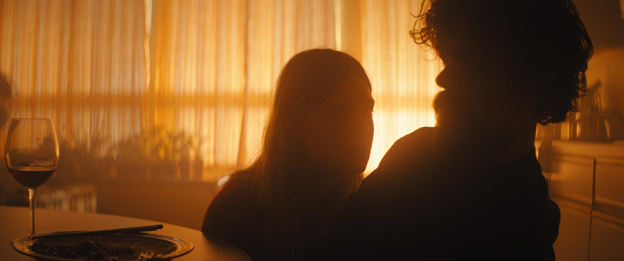
I THINK WE’RE ALONE NOW
Director: Reed Morano
Genre: Drama, Sci-Fi
While I was disappointed that the Tiffany song from which this film takes it name is not played (even once!), I THINK WE’RE ALONE NOW, directed and shot by Reed Morano, uses big science fiction ideas (a mysterious mass extinction, among other things) to stage a small-scale character drama about loneliness and grief. Obviously the film looks beautiful and becomes increasingly impressive upon considering the responsibilities Morano juggled on set to manage two departments. Here the texture and camera work audiences may be familiar with from THE HANDMAID’S TALE are brought into a more lush and bright light (a large portion of this film takes place during sunsets), with the cold upstate New York setting colored boldly. But the actors in this film also shine. As Del, Peter Dinklage offers up the current best permutation of a kind of character he often plays: a tragic hero, misunderstood by many, who ultimately has his heart in the right place. Elle Fanning as Grace is a nice foil, loud, wild, and emotional. Together they bounce off each other and ultimately come together, teaching each other the value of relationships, even strange ones.
If the film was just that, it would be nice, but slight. There is a third act, which opens up a bunch of other big ideas not nearly as thoroughly established, tacking on some thoughts on memory in relation to grief and trauma. It doesn’t entirely work, even if how it expands the world of the film is interesting. That aside, I THINK WE’RE ALONE NOW plays with themes and ideas popular in the post-apocalyptic genre in a much more lean and beautiful package, good fuel for a filmmaker on the up and up. [Ian Campbell]
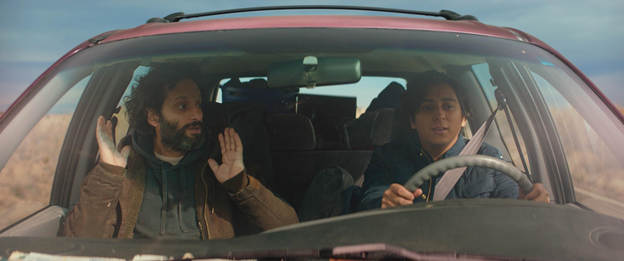
THE LONG DUMB ROAD
Director: Hannah Fidell
Genre: Comedy
Most road movies follow a similar and well-worn structure: straight-man with an admirable goal and a long journey ahead sets off, only to be hampered by a wild, crazy, or straight-up dangerous co-pilot they pick up along the way. In the process they become friends and learn some lessons about life. THE LONG DUMB ROAD, directed by Hannah Ridell, takes this notion to the extreme, stripping down the road movie tropes to their bare minimum, telling a sparse comedy with a genuinely unique opinion. Nat’s (Tony Revolori) heading to art school in LA, hoping to capture “the heart of America” through his photography, when his car suddenly breaks down and Richard (Jason Mantzoukas), a down-on-his-luck mechanic, barges into his life, fixing his car and convincing him to give him a ride to Las Vegas. What follows is a fairly tame road trip, with Richard getting them into trouble with his impulsiveness and the two men butting heads over clear differences in class and outlooks on life. It’s here that THE LONG DUMB ROAD differentiates itself.
Often a lesson these kinds of films espouse is a greater appreciation of life—THE LONG DUMB ROAD takes a different tact. Richard certainly lives a fuller, if more dangerous life, but it’s Nat’s fetishazation of America (“the heart” of America looks a lot more like the working class) that ultimately receives the most criticism from Richard and the film. The characters are at odds, not just because they have dramatically different personalities, but because they’ve received dramatically different opportunities. Centering the film around learning a more complete form of empathy takes it beyond a vehicle for Jason Mantzoukas to be Jason Mantzoukas and into a space with a lot more heart. [Ian Campbell]
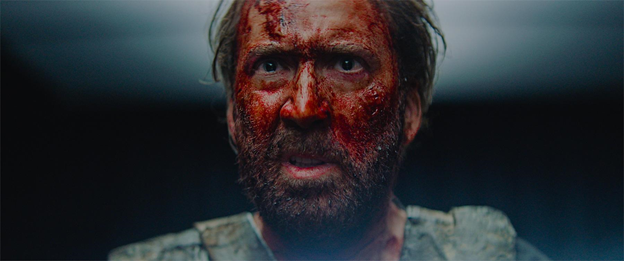
MANDY
Director: Panos Cosmatos
Genre: Horror
About seven years after cult mega-hit BEYOND THE BLACK RAINBOW, weirdo auteur Panos Cosmatos has returned, and this time, he brought Nicolas Cage. MANDY is built to be the ultimate exploitation film, a phantasmagoria of tawdry sex, gore, and Lovecraftian horrors. Backed by a stellar score from Johann Johannsson, the film shows infinite promise in its first scenes . . . But then it keeps hitting those same exact beats . . . Over and over . . . And over again. MANDY takes almost exactly 79 minutes before it finally feels right, mercifully taking the form of the ultimate midnight attraction from Hell. The first two acts are excruciating, pseudo-psychedelic drivel; while I greatly admire the hazy colors and lucid imagery, it feels tailor-made for eight minutes of aesthetic glitz, not the core of the piece. Cosmatos teases a myriad of thrilling concepts and characters, and then holds them off for what feels like eons. If you introduce a demon, cenobite biker gang in the first act, damn you for holding out on using them until the finale.
My relationship with MANDY is complicated: I was infuriated whilst watching, actively contemplating walking out. But then the final 40 minutes happen. And, Reader . . . I cannot stop thinking about how much I love this maddening goddamn film. Nicolas Cage unleashes his animalistic self, crusading on a .gif-friendly massacre that manages to top itself every other second. Cage snorts a mound of coke off a shard of glass, eats demon gunk that gets him even higher, then eventually lights a cigarette with a flaming decapitated head. This is fairly early on. At its best, MANDY is primo Hooper, Carpenter, and Lynch. At its worst, it’s TEXAS CHAINSAW MASSACRE 2, THE WARD, and the trolling moments of TWIN PEAKS: THE RETURN. It’s a rocky viewing, but one I embrace with open arms. Welcome to Nicolas Cage’s BRAWL IN CELL BLOCK 99 and welcome back, Panos Cosmatos. [Kevin Cookman]
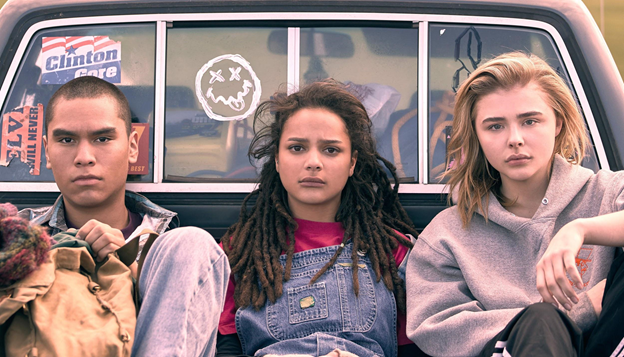
THE MISEDUCATION OF CAMERON POST
Director: Desiree Akhavan
Genre: Drama
There’s something almost comforting about how simple THE MISEDUCATION OF CAMERON POST is in its presentation. It feels humble and real, approachable, mellow, and not interested in elaborate melodrama or visual showmanship. Unlike many other coming-of-age festival favorites, it’s not aesthetically showy, and it shows more concern for performance and mood than anything else. For Chloe Grace Moretz, this protagonist is a welcome opportunity to refine her style of performance. Cameron feels comfortable and confident, with a barely hidden core of confusion and frustration. Moretz plays it close to the chest, taking the time the film’s many long takes allow her to really ruminate on her unique situation.
The film’s idiosyncratic setting is part of the initial draw of this story. After being caught hooking up with her best friend on prom night, Cameron is sent to a evangelical gay conversion camp to be saved. There she meets Jane Fonda (Sasha Lane) and Adam Red Eagle (Forrest Goodluck), who help ease her into her time at the camp and offer hope of a life afterwards. The film is straight-up funny, trying to balance humor with realism like the various John Hughes films that came before it, and it works. The only disadvantage of this performance-focused, generally comedy-oriented story is that the structure of the film feels weirdly non-existent. It’s not ideal when structure is obvious in a movie, but I was surprised when the film ended, and doubly so when I realized that a scene that felt nice and comforting was in fact the character’s deciding to upend the status quo and end the film. Basically, the plot of the film is less important than each character’s current understanding of themselves. All-in-all CAMERON POST is a nice addition to the queer film canon, even if the individual viewer’s mileage may vary. [Ian Campbell]
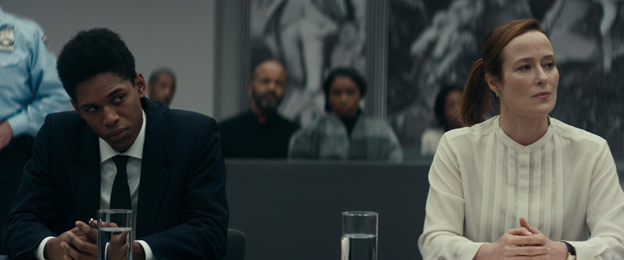
MONSTER
Director: Anthony Mandler
Genre: Drama
A big part of Sundance, at least among people who spend most of their days standing in line, is debating what film will end up being “The One.” Typically a film gains so much critical acclaim, hype, and standing ovation power that it rise above the other excellent films to be the one everyone talks and brags to their friends that they’ve seen. This year’s fest has already brought strong, diverse contenders in THE TALE, SORRY TO BOTHER YOU, and EIGHTH GRADE, but if these are “Ones,” than I have a pretty strong feeling MONSTER is about to join them.
MONSTER has all the ingredients to be popular at Sundance. It’s about a relevant, politically charged subject (race and the criminal justice system) and features a character who is a fan of film. Usually this is enough to boost a film to the top (see: ME AND EARL AND THE DYING GIRL), and MONSTER indulges in the slick style and the occasional heavy-handedness of the films that came before it. But by the time you’re even worrying about that, you’re probably already onboard. This is mainly because the structure of MONSTER is so lovely. It’s nonlinear, centering on several hearings protagonist Steve Harmon (Kelvin Harrison Jr.) attends in an attempt to prove his innocence in an armed robbery, blooming outwards before and during the robbery, stopping along the way to color in Steve’s personality and family. It works well, mainly due to the editing, alternating between the smooth flow of music videos and crazy staccato montages during the courtroom scenes. It’s visually engaging, keeping you close to the characters, in particular the strong performances from Jeffrey Wright (as Steve’s father) and Harrison.
Blended in with these compelling elements are a whole lot of techniques that distract from the general purpose of the film to express the dehumanizing nature of criminal justice. Voiceover can vacillate between evocative to sigh-inducing, music cues can be obvious, and some of the film aesthetics discussions between Steve and his teacher are a bit pointed. Whether that sours the movie for an audience will really vary. They feel like the kind of choices that get made in a first feature, choices that will be toned down or excised in later projects. Diamonds in the rough are still diamonds. [Ian Campbell]
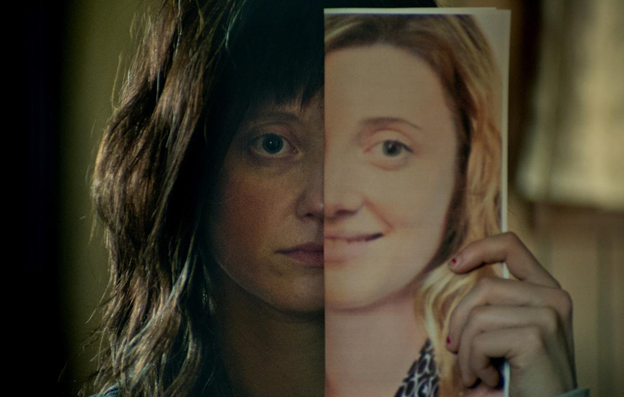
NANCY
Director: Christina Choe
Genre: Thriller
NANCY trades on that familiar “When will they catch on?” tension most recently featured in INGRID GOES WEST, but in a much darker and uncertain setting. Here, Nancy (Andrea Riseborough) takes her life into her own hands when her mother Betty (Ann Dowd) dies in her sleep. Nancy is an aspiring writer and compulsive liar (she fakes a pregnancy and lies to her coworkers about a vacation in the DPRK), but her mother’s death drives her (frees her?) to construct an even darker narrative.
With NANCY, director Christina Choe crafts a prickly and obtuse character: an anti-hero and a tragic hero, someone willing to trade on her ease at lying to craft a better story for herself. Except she’s not so sure about it, and the more confident she feels about telling her lie, the more guilt starts creeping up around her. The problem is that Nancy convinces herself that she’s the kidnapped child of a couple who’ve been missing their own daughter for 30 years. This couple, Leo (Steve Buscemi) and Ellen (J. Smith-Cameron), are both alternatingly suspicious and more than willing to believe that their daughter could still be out there. This game of cat and mouse, with its own kind of queasy tension mounting all the way, makes NANCY an uneasy character study.
Nancy herself is not entirely sympathetic, but her commitment to her lie is strangely admirable, both for its audacity and the positive effect it has on the people most likely to be hurt by her. You don’t necessarily want her to succeed, but you do want to see where things go next. NANCY never gets quite as out there as I’d like and feels almost too low key at times, but that queasy tension it generates is fascinating for a time. [Ian Campbell]

NEVER GOIN’ BACK
Director: Augustine Frizzell
Genre: Comedy
Augustine Frizzell’s NEVER GOING BACK feels an awful lot like an alternate universe where Sean Baker’s YOGA HOSERS exists. Baker’s sensitive yet punk sensibilities of approaching scrappy scavengers left to rot by capitalism mixed with obnoxious, sometimes embarrassing attempts at humor that drag down a wonderful central duo dynamic define this debut, a loud and spunky day-long trek through Butthole, USA. Following Jessie and Angela, two high school dropouts struggling to make back the cash they blew on a birthday vacation they just booked, Frizell zones in on a bizarre generation of hardship that sees citizens living paycheck to paycheck, but still allotting cash for copious amounts of weed, coke, and booze, drinking straight out the tap, but constantly deriding Wal-Mart and K-Mart as sad. It’s not terribly incisive, but Frizzell creates a highly believable sense of this space and reality.
The highlights are Cami Marrone and Maia Mitchell, playing and resembling Garbage Pail Kid versions of Greta Gerwig and Hailee Steinfeld. Like them, they nail both the broadly comedic and conversational moments—their chemistry is unreal, so magnetic that they should carry on as an Abbot & Costello type item. They’re so good that, whenever NEVER GOIN’ BACK decides to cut from them to Jessie’s brother and his friends, the film grinds to a violently unfunny halt. Beer-soaked, shitfaced, and bearing eye make-up from Hell, Marrone and Mitchell deserve better than a try-hard raunchy comedy. Plop these two in a DAISIES-type affair and duck for cover: their energy is nuclear. [Kevin Cookman]
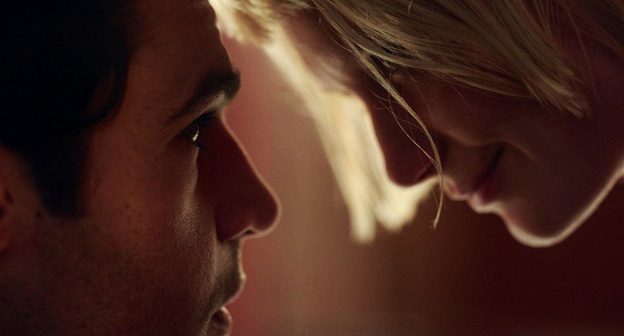
PIERCING
Director: Nicolas Pesce
Genre: Erotic Thriller
A short, barely 80-minute film that should have just been a short film, Nicolas Pesce’s adaptation of Ryû Murakami’s novel suffers from just not having enough meat on the bone. It’s at its best when quick and nasty, and wow, does this get nasty, but PIERCING overstays its already brief welcome with glacially-paced in-between sequences of inconsequential awkward interactions and characters waiting for the other to complete a menial task. It’s not often I prefer a film when it’s doing the most, but PIERCING works like gangbusters when the wallpaper starts animating or when Christopher Abbott’s homicidal everyman hallucinates lusty gimps. Opening with an homage to BEYOND THE VALLEY OF THE DOLLS, with an ice-pick to a baby’s face instead of a pistol in a model’s mouth, the picture begins with such pulpy promise, but the dish arrives undercooked.
Abbott owns the screen with his endearing and satisfying mannerisms bringing life to a stale character, and his co-star, Mia Wasikowska, is an absolute delight. While her character receives nominal development, so cute and weirdly bound to Abbott even though there’s no rev-up to their relationship, she glows as Jackie, a sadistic prostitute with a lurid taste for lethality. She’s ultimately a Manic Pixie Scream Girl (hehe), but one who at least gets the dignity of a top-tier actress. The pair’s tête-à-tête belongs in a film with a stronger vision, this jazzy exercise in style not meshing perfectly with the themes of false assumptions, sexual consent, and the depths of personal perversion we’re willing to test. It’s all about penetration, but PIERCING doesn’t go deep enough. [Kevin Cookman]
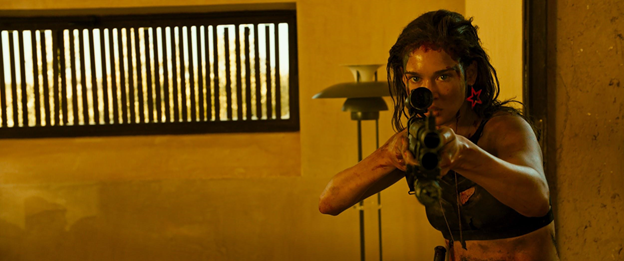
REVENGE
Director: Coralie Fargeat
Genre: Thriller
Trash. Starting with a heavy emphasis on the female protagonist’s ass and ending with the same, but bloody, REVENGE is the type of half-assed, edgy destabilization of tropes that gives modern exploitation a bad name. A rape-revenge tale that stretches into a desert manhunt, Matilda Lutz gives it her all in a role that asks her to strip, bleed, sob, shoot, and stumble every second. This style of film is just so old-hat, the schematics of it being the hugest cheat: most filmmakers recycle the same plot but claim subversion because they spent money on a decent cinematographer, and REVENGE is no different. The arc is the exact same as all other films of this ilk. It objectifies its protagonist in her neutral state, violates her, bludgeons and gores and humiliates her, and then we fear her, concluding with a re-invented killer’s persona that, in full-circle fashion, sexually prizes her once more. In this case, it ends with Lutz touting an elephant’s cock of a big-game shotgun. Overlong and reveling in the basest of gore, I thought genre cinema was past this. Don’t trust filmmakers who still treat wound-stitching or bullet-extraction scenes as prized money-shots. [Kevin Cookman]
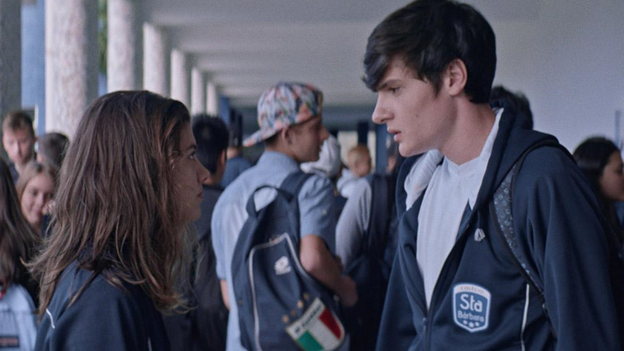
RUST
Director: Aly Muritiba
Genre: Drama
Set and produced in Brazil, RUST explores society’s relationship with social media and the institutional misogyny that it enables. Tatiana (Tiffanny Dopke) has an elicit video of her and her boyfriend leaked to her high school, while the rest of the film deals with that event’s ramifications. If high school is often called a snake pit, here it is an aquarium. Society creates inauthentic recreations of reality, pouring our time into these glass-contained fantasies. Director Aly Muritiba shows us that although these recreations might not be genuine, they can have real consequences.
RUST is a slow moving movie, where the viewer is often forced to reflect and deal with the consequences of its characters. It also forces the audience to consider if social media has been harmfully used in our own lives. The rust of the film refers to the degradation of morality and the ease that comes with hiding behind our phones and computers. But even beyond social media, society hasn’t truly addressed harmful gender-based social dynamics that are merely highlighted on the internet. RUST’s darkest moments feel so scarily attainable because social media malice is so ubiquitous. In this sense, every high schooler should see this film because it isn’t preachy and it doesn’t pull any punches. There is little hope for the film’s more toxic characters and ultimately it serves as a cautionary tale—that is, caution against indifference and a call for empathy. RUST won’t cheer you up and it’s not supposed to, so watch it and let’s have it be the WD-40 to our problems. [Sam Wall]
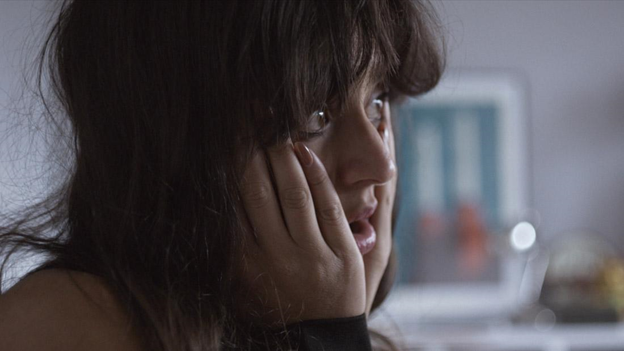
SHORTS PROGRAM 1:
MEN DON’T WHISPER (Jordan Firstman, Comedy), ARIA (Myrsini Aristidou, Drama), GARFIELD (Georgi Banks-Davies, Drama), ZION (Floyd Russ, Documentary), WORLD OF TOMORROW EPISODE TWO: THE BURDEN OF OTHER PEOPLE’S THOUGHTS (Don Hertzfeldt, Animation), DON’T BE A HERO (Pete Lee, Drama)
SHORTS PROGRAM 1 brings together six shorts of different genres, structures, formats and perspectives. However, all are united by their representations of unique identities. MEN DON’T WHISPER tells the story of two gay partners competing to prove their masculinity by having sex with two women. It ultimately proves ironic in the way that even marginalized communities are involved in the harmful treatment of others―in this case, misogyny. ARIA tells the story of two women in Athens, Greece, one Chinese and one Greek. Both end up helping each other achieve certain levels of freedom and show the importance of embracing the other and learning from different cultures. GARFIELD is deceptively simple in its execution. After a night of partying, a newly-met interracial pair wake up and touch upon identity and relationships in England. This is one of the more subtle shorts, but ends up being truly effective in showing that sometimes there is an initial, deep connection between people. ZION tells the incredible story of a boy of the same name who was born without legs. He ends up becoming one of the best wrestlers in the nation and overcomes great obstacles in regards to his disability and rough upbringing. It is an incredible feat of editing and storytelling as in less than 15 minutes considering that one feels like Zion is a truly fleshed out and full person. WORLD OF TOMORROW… is a science-fiction, animated exploration of identity, space, and time. Utilizing clones of a little girl who have now grown up, true identity and the preservation of the soul are called into question. But ultimately it comes down to the fact that happiness and human connection remain more important than the ability to live forever (trippy, I know). Lastly, DON’T BE A HERO also plays with different identities through gender as the short follows a female bank robber who dresses a male cowboy during her robberies. She deals with abuse and guilt in her small town but ultimately shows something greater, in that only by becoming a man can she hold power. [Sam Wall]
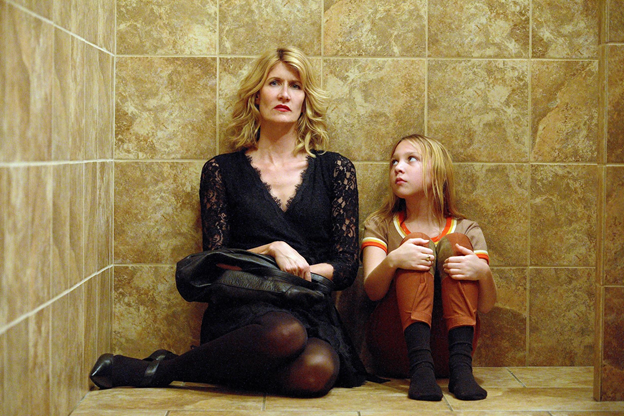
THE TALE
Director: Jennifer Fox
Genre: Drama
THE TALE is the hardest film at the fest to write about, both because of its content and its director’s relationship to it. Director Jennifer Fox’s first fiction film (she’s received acclaim for her documentary features), as a debut feature it’s a strong entry with an interesting narrative mechanic lifted from documentary and generally strong performances. But THE TALE is also a retelling of Fox’s experience as a child, adapted from a short story she wrote from English class at 13. The Jennifer Fox of the film (played empathetically by Laura Dern) begins investigating her past when her mother sends her a copy of her short story, clearly concerned that she’s missed something all these years. From here Fox literally interrogates her past by doing “interviews” with in-character actors playing her abusers, recontextualizing the “relationship” she had as a child and coming to terms with what happened to her.
It’s a hard watch, for how explicit it is, how personal it is, and how its construction and performance create a general sense of unease. There are moments when I had to look away from the screen, when characters said things to young Jennifer Fox and older Jennifer Fox that prompted disgust and genuine fear. In a sense this film couldn’t have found a better time to come out, but also a worse time. As a “conversation-starter” (truly underselling the film) THE TALE can only add to the general momentum in the industry and world, but categorizing the film under a #movement that way does it a disservice simply because of how personal it is to its creator. I can’t assume anything about Fox’s intentions, but I think sometimes a film can be important simply because it’s incredibly meaningful to its creator. So I guess, having watched and been moved by THE TALE, even with some imperfections in writing or performance, I’d like to assume it was just that, an incredibly meaningful and cathartic experience for Jennifer Fox and hopefully for many who watch it. [Ian Campbell]
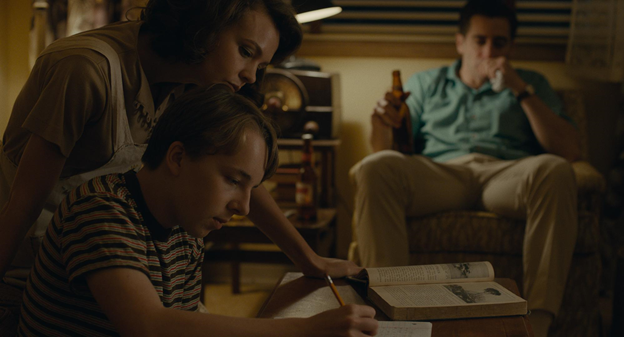
WILDLIFE
Director: Paul Dano
Genre: Drama
The American identity is composed of a variety of often conflicting ideologies: freedom balanced with draconian or authoritarian policies, pride in the face of cultural signifiers that encourage the exact opposite, equality in a society with hard divisions between race, class, and gender. With all these forces tugging in opposite directions, the basic “unit” of America, the nuclear family, is a remarkably fragile thing. With his adaptation of Richard Ford’s novel WILDLIFE, Paul Dano explores this fragility and how destructive doubt can be to a family just barely treading water.
WILDLIFE concerns the Brinson family, recently moved to Montana for new opportunities, and their attempts to achieve a foothold in their community and life after suffering an economic setback. As an adaptation co-written by Dano and Zoe Kazan, WILDLIFE is unsurprisingly literary, restrained in its performances but beautiful and expansive in its imagery and metaphor. The cold distance the film expresses early on is itself an example of the trouble the characters have living up to their expectations of themselves and their peers. For Jake Gyllenhal’s Jerry, that means losing it and running off to fight fires along the Canadian border. Carrie Mulligan’s Jeannette spins out along a different path, pursuing independence and an extramarital affair. All while their son Joe (Ed Oxenbould) attempts to make sense of his parent’s rapidly dissolving marriage. On some level this narrative is not new, but in the hands of Kazan and Dano it feels almost Biblical, an avatar for American ideas and faults that haunt the nation beyond this film’s ‘60s setting. To say that feels hyperbolic, but with a film as subtle as WILDLIFE, there’s a lot of room to project big ideas and even bigger feelings. WILDLIFE is the epitome of a strong, well-considered debut. [Ian Campbell]




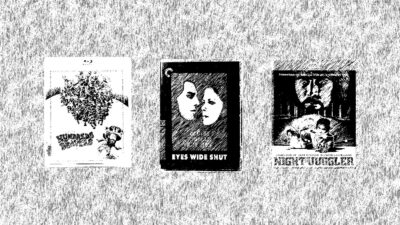










Comments